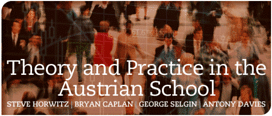Steve’s responses to his commentators, as well as some of the comments made by Bryan and Antony, encourage me to further clarify my opinions on the matter of “Austrian” versus non-Austrian economics.
I’m anxious, first of all, to explain that, by saying that Josh Barro “has a point” when he claims “that Austrian economists reject empirical analysis,” I didn’t at all mean to indicate any general approval of Barro’s condemnation of Austrian economics. On the contrary, despite my managing to find some truth in one of Mr. Barro’s obiter dicta, his essay amounts to nothing more than the crudest of caricatures of Austrian economics, free of the least indication that Barro actually read any of the works he so sweepingly condemns. On the contrary: the essay gives one the distinct impression that Mr. Barro, finding himself in the mood for some conservative-bashing, reached for the nearest hard object and just happened to grab The Road to Serfdom.
What’s more, the grain of truth residing in Barro’s philippic consists of an observation he might also have made, with equal if not greater justice, regarding a very considerable chunk of “mainstream” economics. Like I said, regarded as a claim about “pure theory,” there is, or ought to be, absolutely nothing controversial about the Misesian assertion that economics is “a priori.” Moreover, even the purest of pure Austrian theories, from Menger’s theory of value to Kirzner’s theory of entrepreneurship, have a far better claim to being more empirically grounded, or less factitious, than, say, Debreu’s axioms or Wallace’s overlapping-generations model of money or any number of other celebrated mainstream hobby-horses.
But what I find most obnoxious about Barro’s essay is, ironically, precisely what I find obnoxious about some “hard-core” Austrian writings, namely, the suggestion that there is only one sort of good economics, consisting of work that conforms to this or that set of methodological strictures. Barro’s “Real economics is empirical”; the rest is “philosophy dressed up as economics” is no better than the extreme praxeologist’s “Real economics is a priori”; the rest is “history dressed up as economics.”
As for what constitutes “real” Austrian economics, although I would not go so far as Bryan Caplan does in suggesting that Steve does an about face by admitting that some “real Austrians” are indeed uncompromising “a priorists,” I do think that Steve’s acknowledgement turns his original defense of Austrian economics against Barro’s accusation into what amounts to a defense of the GMU Austrians only. But Steve also observes, with justice, that the GMU Austrians make up a sizable component of the whole; and if Steve’s original criticism of Barro was ill-formulated insofar as it pretended that there were no targets toward which Barro’s claims were well-aimed, it doesn’t follow that Steve was wrong in criticizing “the Josh Barros of the world for their incomprehension of Austrian economics.” After all, if you are going to make sweeping claims, publicly, about the worth of an entire school of economic thought, you ought to feel obliged to know something concerning what a large and highly visible group within that school has been up to during the last decade or so.
And yes, Peter Boettke deserves credit for much of the work going on at GMU. I didn’t mention him by name simply because I regard him as carrying on—with admirable success—the work begun by Don Lavoie, whom I did mention, who was Peter’s own mentor (and Steve’s also).
Finally, I couldn’t help being amused by the defense of mathematical modeling in Antony Davies’s otherwise very sensible plea for treating Austrian and mainstream perspectives on economic method as complementary rather than competing paradigms. Antony imagines that when someone says “Nothing is better than cake,” he may be understood to mean either that cake is better than anything other than cake or that having nothing to eat at all is better than having cake. The equation
U(cake) > U(g) ∀ g,
where g stands for consumption goods of all sorts, is therefore to be preferred, Antony claims, as an unambiguous way of conveying the first meaning.
Is this compelling? Well, no. To make the point, allow me to first replace “Nothing is better than cake” with “Nothing beats cake.” Doing so actually compounds the potential for alternative interpretations that Antony worries about, since “beat” might mean either “best in a competition” or “pummel.” Yet to any ordinary English speaker the phrase surely “beats” the equation, for the simple reason that context and other considerations actually make it quite unambiguous. What’s more, the chosen equation badly misrepresents the true meaning of the phrase, which is really something like, “Isn’t cake great” or “Everyone loves cake,” not “Cake gives me more utility than anything else I might consume”: the math loses the crucial appeal to some supposedly universal or at least not entirely subjective measure of cake’s worth. (I set aside the question whether or not the “unambiguous” equation refers to marginal units, though anyone familiar with the diamond-water paradox will understand that this is no trivial matter.) Well, you get the point. In short, it isn’t merely owing to an unwillingness to be precise that humans generally prefer to communicate with words. Yet I’m afraid that some economists are all too willing to imagine that by trading plain English for even the most fatuous equation, they are making their arguments more “rigorous.” Fritz Machlup—himself a great Austrian economist—liked to say that such economists suffer from rigor mortis.

